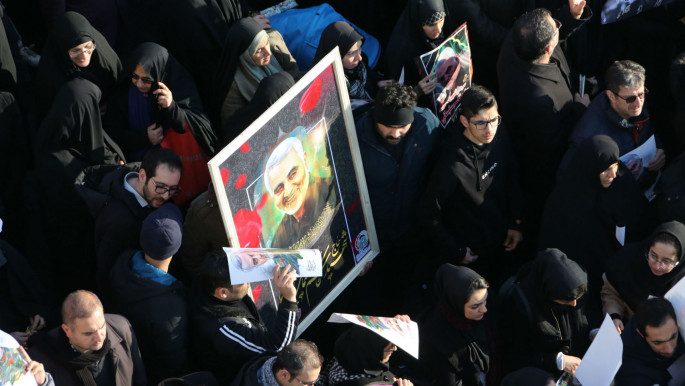Trump threatens sanctions on Iraq that makes Iran’s 'tame' if US troops are expelled
President Donald Trump warned of sanctions if the Iraqi government attempts to kick out American troops, as tension continues over the killing of Iranian commander Qassem Soleimani.
3 min read
Donald Trump isn't pulling punches [Getty]
In events that shocked the world over the weekend, Donald Trump ordered airstrikes that killed top Iranian commander Qassem Soleimani, and now he has said that the US may target Iranian cultural sites amidst warnings that doing so would constitute a war crime.
The US president brushed off concerns from within his own administration that attacking cultural sites could be considered a war crime under international law, and warned Iraq that he would levy punishing sanctions if Baghdad expelled American troops in retaliation for a US airstrike that killed Soleimani.
Trump's comments Sunday came amid escalating tensions in the Middle East following the killing of Major General Qassem Soleimani, the head of Iran’s elite Quds Force.
Iran has vowed to retaliate, and Iraq's parliament responded by voting Sunday to oust American troops based in the country.
Trump first raised the prospect of targeting Iranian cultural sites Saturday in a tweet.
The US president brushed off concerns from within his own administration that attacking cultural sites could be considered a war crime under international law, and warned Iraq that he would levy punishing sanctions if Baghdad expelled American troops in retaliation for a US airstrike that killed Soleimani.
Trump's comments Sunday came amid escalating tensions in the Middle East following the killing of Major General Qassem Soleimani, the head of Iran’s elite Quds Force.
Iran has vowed to retaliate, and Iraq's parliament responded by voting Sunday to oust American troops based in the country.
Trump first raised the prospect of targeting Iranian cultural sites Saturday in a tweet.
|
Speaking to reporters on Sunday, he doubled down on his vow - despite potential ramifications.
"They're allowed to kill our people. They're allowed to torture and maim our people. They're allowed to use roadside bombs and blow up our people," he said.
"And we're not allowed to touch their cultural sites? It doesn't work that way."
The targeted killing of Soleimani divided people in the Middle East, with some in Iraq and Syria celebrating the death of the commander, who had been instrumental in the Syrian war that has resulted in hundreds of thousands of civilian deaths.
Read More: The Iraq Report: Iran's power in Iraq now questioned after US kills Soleimani
Others argued that his death at the hands of Washington could destabilise the region and kickstart yet more attacks on American bases.
There are more than 5,000 American troops still in Iraq, 17 years after the US invaded.
On Sunday, Iraq's parliament voted in favour of a non-binding resolution calling for the expulsion of the American forces.
Trump responded by saying he refuses to pull out his troops without being paid for military investments in Iraq over the years.
"We will charge them sanctions like they’ve never seen before," he told the press. "It'll make Iranian sanctions look somewhat tame. If there’s any hostility, that they do anything we think is inappropriate, we are going to put sanctions on Iraq, very big sanctions on Iraq."
He added: "We're not leaving until they pay us back for it."
 |
| Mourners carry a picture of Qasem Soleimani, as they walk in a funeral procession [Getty] |
Targeting Soleimani fueled anxiety in the US, with many seeing it as a deliberate escalation in tensions between Washington and Tehran.
Secretary of State Mike Pompeo said the US military could strike at more Iranian leaders if the Islamic Republic retaliates.
He swerved questions about Trump's threat to attack Iranian culture sites, insisting only that the US intends to "behave inside the system".
"We always have and we always will."
Trump's warnings rattled some administration officials, and one US national security official said the president had caught many in the administration off guard and prompted internal calls for others in the government, including Pompeo, to clarify the matter.
The official, who was not authorised to speak publicly to the issue, said clarification was necessary to affirm that the US military would not intentionally commit war crimes.
Oona Hathaway, an international law professor at Yale and a former national security law official in the Defence Department's legal office, said Trump’s threat amounted to "a pretty clear promise of commission of a war crime".





 Follow the Middle East's top stories in English at The New Arab on Google News
Follow the Middle East's top stories in English at The New Arab on Google News
![The UAE is widely suspected of arming the RSF militia [Getty]](/sites/default/files/styles/image_330x185/public/2024-11/GettyImages-472529908.jpg?h=69f2b9d0&itok=Yauw3YTG)
![Netanyahu furiously denounced the ICC [Getty]](/sites/default/files/styles/image_330x185/public/2024-11/GettyImages-2169352575.jpg?h=199d8c1f&itok=-vRiruf5)
![Both Hamas and the Palestinian Authority welcomed the ICC arrest warrants [Getty]](/sites/default/files/styles/image_330x185/public/2024-11/GettyImages-2178351173.jpg?h=199d8c1f&itok=TV858iVg)